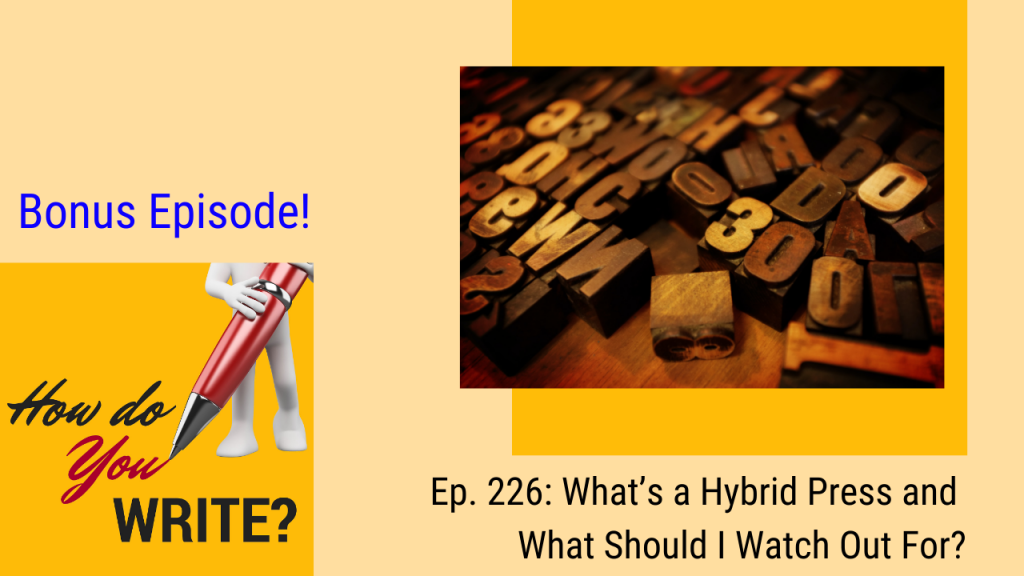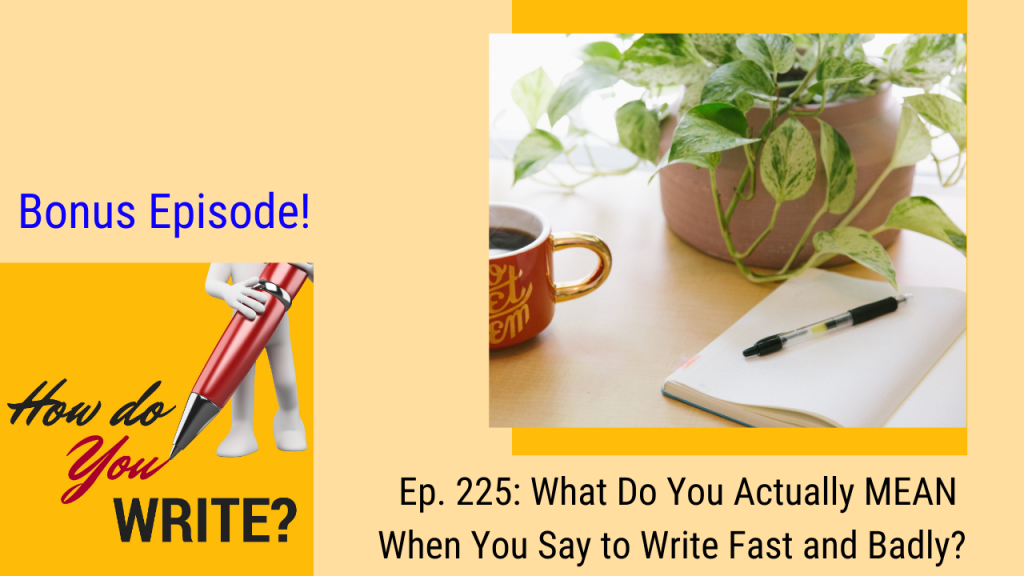In this episode, Rachael dives deeply into hybrid presses. What’s the difference between them and assisted self-publishing? Or vanity presses? How can you tell the difference, and most importantly, how can you protect yourself from being scammed?
How Do You Write Podcast: Explore the processes of working writers with bestselling author Rachael Herron. Want tips on how to write the book you long to finish? Here you’ll gain insight from other writers on how to get in the chair, tricks to stay in it, and inspiration to get your own words flowing.
Join Rachael’s Slack channel, Onward Writers: https://join.slack.com/t/onwardwriters/shared_invite/zt-7a3gorfm-C15cTKh_47CEdWIBW~RKwg
Links:
Hybrid Publishing criteria: https://www.ibpa-online.org/page/hybridpublisher
Jane Friedman: https://www.janefriedman.com/evaluate-small-publisher/

Transcript:
Rachael Herron: [00:00:00] Welcome to “How do you Write?” I’m your host, Rachael Herron. On this podcast, I talk to authors about how they write, what their process is and how their lives fit together. I’ll keep each episode short so you can get back to writing.
[00:00:16] Well, Hello writers! Welcome to episode #226 of “How do you Write?” I’m Rachael Herron. This is a mini episode and it is about Hybrid Presses. So welcome to this. This is one of those questions that I get asked over and over again by students, they’ll come to me and say, I found this, this publishing house, this small press. Do you think they’re reputable? They call themselves a hybrid press. I love to get this question because I get so angry at predatory practices within publishing. So let’s talk about what you should look out for and how you can test what you are finding out there when you are looking for presses to publish your work, when you are looking for places to submit your work to. So let’s start at the very top. We’re going to start talking about this hierarchically, which is not that easy to say. [00:01:12] So in publishing, we have traditional publishers and what is a traditional publisher? A traditional publisher is someone who buys your book from you. You signed a contract, giving them certain rights. They then edit, copyedit it, make the cover, do the press, do the marketing as much as they can. We know that traditional publishers struggle with this as much as we do as authors, but with a traditional publisher, there’s never going to be a charge for you. They will only pay you either in advance or in royalties, hopefully both. But there’s never any charge for the author. What is a traditional publisher? A traditional publisher includes anybody in the big five, which are the big five New York traditional publishers left soon to be the big four since Penguin Random House just bought Simon and Schuster. So all of their hundreds of imprints that those four big, the big four have, they have hundreds of imprints and they publish about a hundred thousand books a year in the States total. They are the big, ones. The biggies, you cannot normally there are sometimes a couple of exceptions, but you cannot get a traditional publishing deal without an agent. You must have an agent. They do not accept un-agented manuscripts in the big four or the big five wherever we are when you’re listening to this. Also falling under the umbrella of a traditional publishers are small presses. They are still traditional publishers because you don’t pay them anything. They buy rights to your book and they pay you in advance and royalties. They are like Grey Wolf or 10 House Press or Catapult. You can Google what the best small presses are. It’s a little bit confusing cause words are always changing in and around publishing small presses also used to be known as, or small publishers also used to be known as independent publishers, independent presses. [00:03:22] However, a lot of the time now, when we say independent publisher, we’re talking about self-publishing. So a more common term for these smaller publishers is either small publisher or small press and they are legit and they do a great job purchasing the rights and then doing the best with those rights to produce beautiful books that are then distributed and marketed in physical format into bookstores. That is what traditional publishing does. It helps your book become its best by using the best people to help you. And then it is distributed into brick and mortar stores, traditional publishing that’s the model. Then we come into some other ideas. We have self-publishing, also known as indie publishing, which is where you do it all yourself. You write the book, you hire an editor, you hire a copy editor, you hire a proofreader, you hire a cover designer. You must hire all of those things out. I mean, you don’t have to. You can do whatever you want, but it’s generally safer. You will get better reviews and better sales. If you make your book the best product it can be. Then there are these confusing places. And these, this is what I’m really talking about today. This is, these are where I get these emails from students or from listeners to the show saying, is this legit? Is this legit? Obviously a vanity press is not legit. In vanity press is anyone who says, you give us your money and we will produce your book for you. There’s- in a vanity press, there’s not even a nod toward quality or editing. There’s no nod toward marketing. It is just a scam to get your money. They are not making money from selling books. They are making money from you, the author paying them. Honestly, if you’re writing one book that you want, your three grandkids to read, perhaps a vanity press would be for you, you get the copies of your books. They can give them to you, three grandkids you’re done, but otherwise they are for no one. They are a scam. [Read more…] about Ep. 226: What’s a Hybrid Press and What Should I Watch Out For?